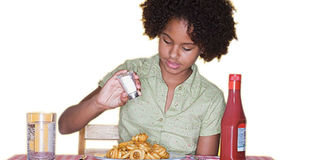The trouble with too much salt

Experts warn against adding uncooked salt to your food. When the salt is cooked, its iron structure changes and so it becomes easier for the body to absorb. PHOTO/INTERNET
Salt adds flavour to food and is sometimes used as a preservative. Although some people usually consume a lot of salt in the meals they cook at home, junk, quick and processed foods are the highest contributors of high amounts of salt in our diets.
Dr Paul Kasenene, a nutritionist, says salt is a combination of sodium and chloride. Sodium, a mineral, is essential for ideal muscle and nerve function while chloride helps the body maintain proper water and mineral balance. Despite these important functions, an abnormal intake of salt in a single meal or even over a period of time has a great impact on your body.
Short term effects
The very first noticeable impact of eating too much salt in a single meal is intense thirst.
“If you are not able to drink as much water the body needs to dilute the sodium, it will drain water from bodily cells and this in turn can result in confusion, difficulty breathing, restlessness, reduced urination and sometimes seizures,” Dr kasenene says.
Since the kidneys are responsible for maintaining a specific amount of sodium to water ratio, when your meals are very salty, they hold on to any extra water in a process called water retention. This in turn can result in the swelling of hands and feet.
Also, a single meal that is very high in sodium leads to a temporary rise in blood pressure due to large volumes of blood flowing through the arteries and veins.
Long term effects
According to Amanda Twebaze, a nutritionist, eating meals that are very high in sodium chloride increases water retention in the body and the extra water increases the volume of blood in the body.
The heart then works harder because it pumps more blood through the vessels which puts more force on them.
Over time, the force raises blood pressure and damage to the blood vessels. This also increases the risk of heart disease as well as stroke.
Also, eating food that has a lot of salt is said to increase one’s risk of stomach cancer. She also adds that people with health conditions like diabetes, heart failure, as well as liver or kidney disease, may experience fatal effects if they routinely consume meals that are high in sodium chloride.
Counteracting the salt
If you are buying processed and packed foods from supermarkets and food stores, it is important that you read the labels on the packs to see the amount of salt that is contained in a particular food.
If possible, cook your own meals. This will help you regulate the amount of salt intake.
You may have eaten out or cooked your meals but then you realise that you have had a very salty meal, there are ways you can help your body compensate according to Dr Kasenene.
He says, “It is important at that time that you drink a lot of water to help you get the desired sodium to water ratio in order to prevent water retention that may come thereafter.”
Potassium
He adds that potassium-rich foods are good at counteracting high sodium intake because it helps in body fluid balance. Fruits, legumes, vegetables, seeds and nuts as well as dairy products are very rich in potassium.




